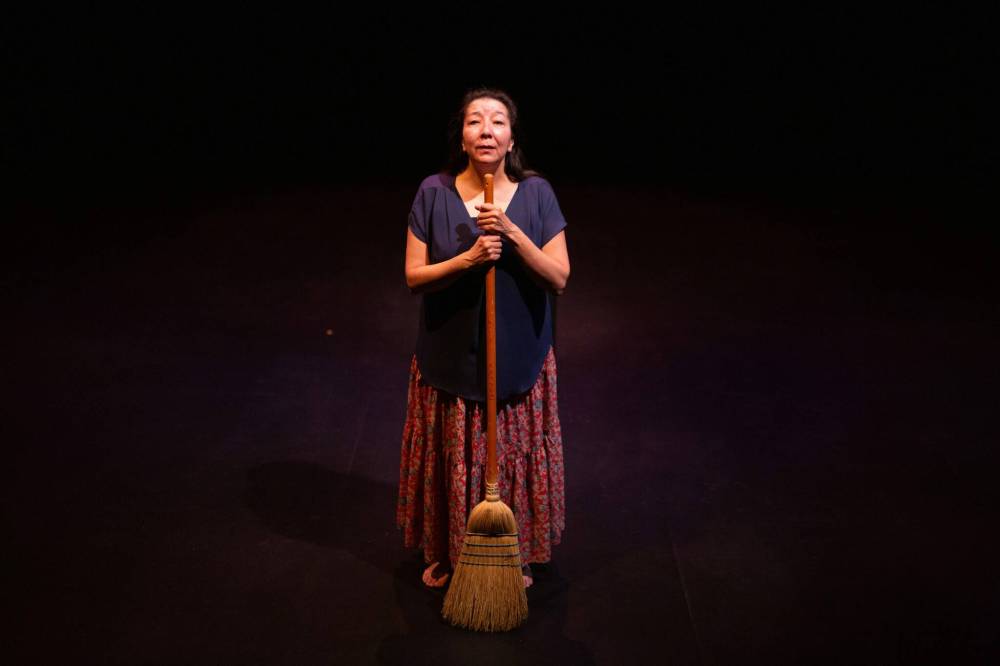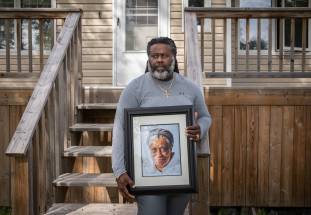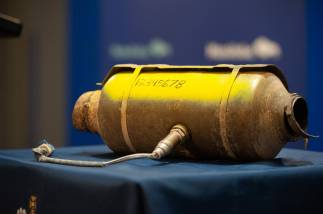Yvette Nolan’s pandemic play remains painfully relevant
Read this article for free:
or
Already have an account? Log in here »
To continue reading, please subscribe:
Monthly Digital Subscription
$0 for the first 4 weeks*
- Enjoy unlimited reading on winnipegfreepress.com
- Read the E-Edition, our digital replica newspaper
- Access News Break, our award-winning app
- Play interactive puzzles
*No charge for 4 weeks then price increases to the regular rate of $19.00 plus GST every four weeks. Offer available to new and qualified returning subscribers only. Cancel any time.
Monthly Digital Subscription
$4.75/week*
- Enjoy unlimited reading on winnipegfreepress.com
- Read the E-Edition, our digital replica newspaper
- Access News Break, our award-winning app
- Play interactive puzzles
*Billed as $19 plus GST every four weeks. Cancel any time.
To continue reading, please subscribe:
Add Free Press access to your Brandon Sun subscription for only an additional
$1 for the first 4 weeks*
*Your next subscription payment will increase by $1.00 and you will be charged $16.99 plus GST for four weeks. After four weeks, your payment will increase to $23.99 plus GST every four weeks.
Read unlimited articles for free today:
or
Already have an account? Log in here »
Hey there, time traveller!
This article was published 20/09/2022 (1181 days ago), so information in it may no longer be current.
When she wrote it, Yvette Nolan didn’t think a play meant to welcome audiences back to the theatre and alleviate their worries would be necessary two years into the pandemic.
Foolishly, she says, she and everyone else thought everything would be roughly back to normal by now.
Theatre preview
Katharis
● Online at pte.mb.ca
● Friday to Oct. 2
● Free
But Nolan’s Katharsis, a digital performance starring Tracey Nepinak and devised for Prairie Theatre Exchange in the fall of 2020, is just as relevant today as it was two long years ago.
In some ways, it’s taken on even more meaning.
Throughout the 16-minute monologue, which runs online through PTE starting Friday, Nepinak’s character reckons with this plague, this unwanted and unmerciful visitor which has shifted reality, erased opportunity and turned time into a substance like taffy, stretching and contracting in unpredictable and indescribable ways.
Nepinak’s character uses a clinical term — PTSD, or post-traumatic stress disorder — to describe what many are feeling. Trauma, her character tells an empty theatre, ruptures three things: a sense of identity, cognition and time. We are not the same as we were before, we cannot make sense of what has happened and we cannot comprehend the passage of time.
“I didn’t realize how prescient it would be,” says Nolan, who has to check a calendar to figure out when she wrote the play. Her memory of that period is fuzzy: there were yeast shortages, a fair amount of paranoia and a lot of apocalyptic fiction soaring up the bestseller list.
Nolan kept turning back to a certain chapter of Stephen King’s book The Stand, in which a pathogen wreaks havoc on society in a manner eerily parallel to COVID-19.
SUPPLIED Playwright Yvette Nolan penned Katharsis in 2020 as a response to the pandemic.
In considering the pandemic a collective trauma, Nolan, whose mother survived residential schools, worked through how it affected her own life and artistic community, with hopes of achieving catharsis; Nolan chose to spell it with a K to hark back to its origins in Greek, a language used in much of the most historically influential theatre and theatrical theory.
The short-term effects — cancelled shows, loss of work and income — were obvious. But the long-term impact of the trauma still remained to be seen.
Directed by PTE’s artistic director, Thomas Morgan Jones, Nepinak’s character serves as a kind of conduit for a supportive message: everyone watching has been through something very difficult. Even those “lucky” ones who hadn’t gotten hit by the “plague” were by no means unaffected.
She also likens a pandemic to a war, and says that after war, in many Indigenous communities, warriors did not immediately return to life among the people as they’d lived before. They returned in a staged manner, needing to ease their way back into society, to be rid of the emotional shrapnel of war.
“What we’ve been through is a traumatic episode. And how do we return to society without some kind of ritual, without some kind of recognition?”–Yvette Nolan
“What we’ve been through is a traumatic episode,” says Nolan, an accomplished playwright who lives in Saskatoon but was raised in Winnipeg. “And how do we return to society without some kind of ritual, without some kind of recognition?”
Nepinak’s character mentions a friend who was suffering and was brought to a sweat, a traditional ceremony, which helped “begin a healing journey.” That sacred rite is a subtle analogy for the potential power of theatre, which Nepinak’s character says has always been used as a means to make sense of the world.
“I believe theatre is critical to us and vital to us as human beings,” Nolan says. “It’s often a way to make sense, and now that the world is so bad, so out of control, so uncertain, I think theatre is one of the few places we can actually sit with people with different beliefs, see the same story, and have a connection made.”
For Nolan, the pandemic was also a case of “Mother Nature telling us something” — that we needed to stop, listen and do what we could to help one another.
JOEY SENFT PHOTO Tracey Nepinak stars in Katharsis, a monologue about trauma that is being reprised by PTE this fall.
In Nolan’s life, that meant being more judicious about how she spent her time, working with artists who inspire her, spending as much time outdoors as possible — finding catharsis through art and action.
“It’s like Warren Zevon said: we have to enjoy every sandwich,” Nolan says, quoting the late singer’s words of wisdom after his terminal cancer diagnosis.
Theatre, as ever, is a form of sustenance, Nolan says. And even if there still remains some hesitance, “people are hungry to be in a crowd.”
Nolan admits she hoped Katharsis would have been a document of a specific moment in time, rather than a still-valuable pep talk for an audience coping with the ongoing anxiety of the pandemic.
“I thought (this production) would be something that I did then,” she says, alluding to whenever it was that she wrote it. “But it’s still relevant, and maybe even more relevant. And that’s both great and terrible.”
ben.waldman@winnipegfreepress.com

Ben Waldman covers a little bit of everything for the Free Press.
Our newsroom depends on a growing audience of readers to power our journalism. If you are not a paid reader, please consider becoming a subscriber.
Our newsroom depends on its audience of readers to power our journalism. Thank you for your support.







